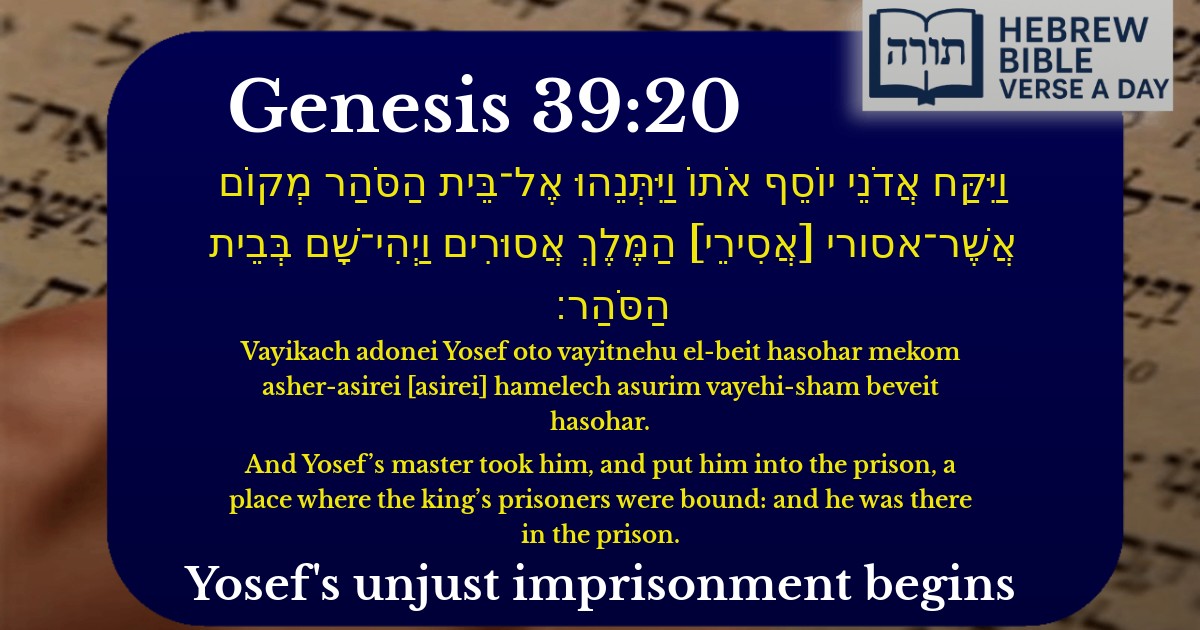Join Our Newsletter To Be Informed When New Videos Are Posted
Join the thousands of fellow Studends who rely on our videos to learn how to read the bible in Hebrew for free!
Hebrew Text
וַיִּקַּח אֲדֹנֵי יוֹסֵף אֹתוֹ וַיִּתְּנֵהוּ אֶל־בֵּית הַסֹּהַר מְקוֹם אֲשֶׁר־אסורי [אֲסִירֵי] הַמֶּלֶךְ אֲסוּרִים וַיְהִי־שָׁם בְּבֵית הַסֹּהַר׃
English Translation
And Yosef’s master took him, and put him into the prison, a place where the king’s prisoners were bound: and he was there in the prison.
Transliteration
Vayikach adonei Yosef oto vayitnehu el-beit hasohar mekom asher-asirei [asirei] hamelech asurim vayehi-sham beveit hasohar.
Hebrew Leining Text
וַיִּקַּח֩ אֲדֹנֵ֨י יוֹסֵ֜ף אֹת֗וֹ וַֽיִּתְּנֵ֙הוּ֙ אֶל־בֵּ֣ית הַסֹּ֔הַר מְק֕וֹם אֲשֶׁר־<span class="mam-kq"><span class="mam-kq-q">[אֲסִירֵ֥י]</span> <span class="mam-kq-k">(אסורי)</span></span> הַמֶּ֖לֶךְ אֲסוּרִ֑ים וַֽיְהִי־שָׁ֖ם בְּבֵ֥ית הַסֹּֽהַר׃
וַיִּקַּח֩ אֲדֹנֵ֨י יוֹסֵ֜ף אֹת֗וֹ וַֽיִּתְּנֵ֙הוּ֙ אֶל־בֵּ֣ית הַסֹּ֔הַר מְק֕וֹם אֲשֶׁר־[אֲסִירֵ֥י] (אסורי) הַמֶּ֖לֶךְ אֲסוּרִ֑ים וַֽיְהִי־שָׁ֖ם בְּבֵ֥ית הַסֹּֽהַר׃
🎵 Listen to leining
Parasha Commentary
📚 Talmud Citations
This verse is not quoted in the Talmud.


Context of the Verse
The verse (Bereshit 39:20) describes Yosef being cast into prison after being falsely accused by Potiphar's wife. This event marks a pivotal moment in Yosef’s journey, leading to his eventual rise to power in Egypt. The Torah emphasizes that this was not an ordinary prison but "בֵּית הַסֹּהַר," a place where "אֲסִירֵי הַמֶּלֶךְ" (the king’s prisoners) were held.
Rashi’s Commentary
Rashi explains that "בֵּית הַסֹּהַר" refers to a dungeon or a place of confinement, derived from the root "סהר," meaning to encircle or enclose. He notes that this was a prison designated for high-ranking prisoners, specifically those who had offended Pharaoh. This detail is significant because it sets the stage for Yosef’s eventual encounter with Pharaoh’s chief butler and baker, which leads to his interpretation of their dreams and his rise to prominence.
Midrashic Insights
The Midrash (Bereshit Rabbah 87:10) elaborates that Yosef was placed in this particular prison as part of divine providence (השגחה פרטית). Hashem orchestrated events so that Yosef would be in the same prison as Pharaoh’s servants, ensuring his path to leadership. The Midrash also teaches that Yosef’s imprisonment was a test of his faith and resilience, preparing him for his future role as a leader.
Rambam’s Perspective
Rambam (Hilchot De’ot 2:3) discusses the importance of trusting in Hashem even in times of hardship, using Yosef as an example. Despite being unjustly imprisoned, Yosef maintained his righteousness and faith, which ultimately led to his redemption. Rambam emphasizes that Yosef’s steadfastness in prison demonstrated his unwavering belief in divine justice.
Symbolism of the Prison
Halachic Implications
The Gemara (Shabbat 30a) derives from this verse that even in confinement, a person must strive to sanctify Hashem’s name. Yosef’s conduct in prison—maintaining his integrity and interpreting dreams—serves as a model for how one should act under duress, fulfilling the mitzvah of kiddush Hashem even in challenging circumstances.